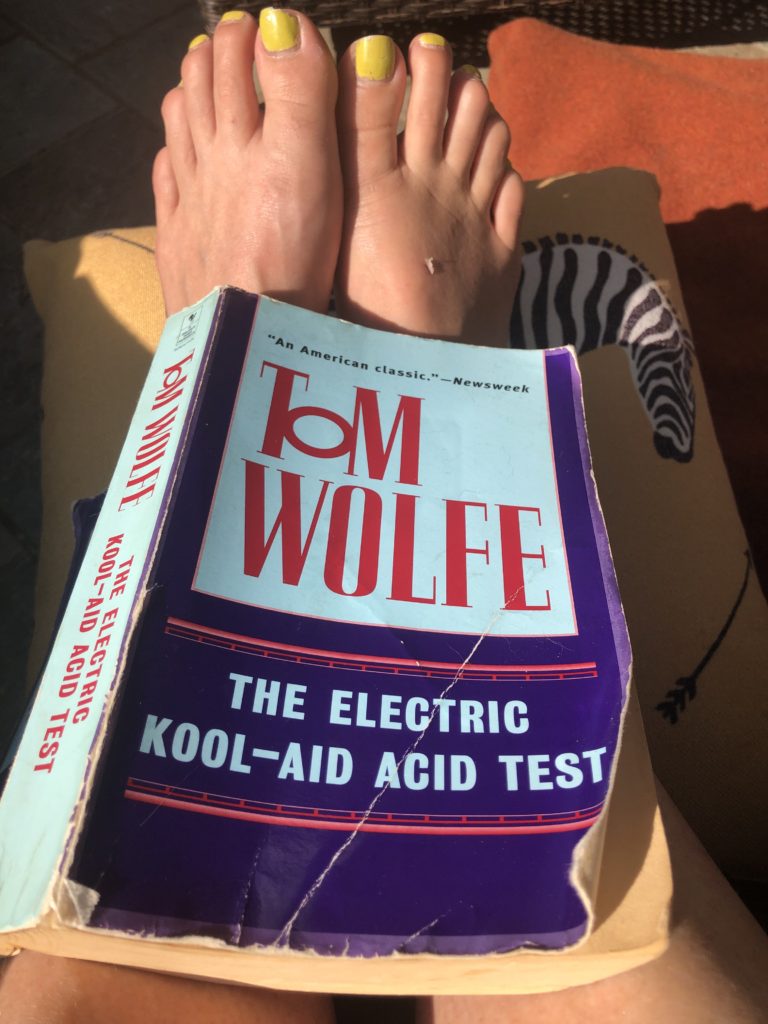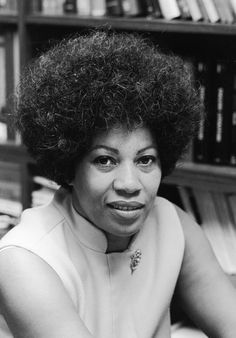 I’ve been rereading The Electric Kool-Aid Acid Test for a week now–I need to revisit it for the majorly druggy section of my bildungsRosman–and it’s so intense and so intensely racistsexisthomophobic that I have to put it down periodically and read something cooling and smart like this 90s interview with Toni Morrison. The biggest conclusion I have drawn (and it’s a fucking embarrassing one) is that next to Edmund White and Eve Babitz Tom Wolfe most influenced my writing style and methodology. I forgot how many times as a teen I read this book and all of his other books to boot. I even called myself the girl with the brown lipstick after a minor character in Bonfire. Oy, they say people don’t really change but the woman I am now can barely stand Wolfe’s status-quo-reinforcing jive. But his in-the-flow, in-the-glow, hyper-italicized, hyper-hyphenated, hyper-dimensional stream-of-consciousness self-possession? I guess it’s in my blood for good. Notice what you notice, he bellows in 24-point type, and I always have.
I’ve been rereading The Electric Kool-Aid Acid Test for a week now–I need to revisit it for the majorly druggy section of my bildungsRosman–and it’s so intense and so intensely racistsexisthomophobic that I have to put it down periodically and read something cooling and smart like this 90s interview with Toni Morrison. The biggest conclusion I have drawn (and it’s a fucking embarrassing one) is that next to Edmund White and Eve Babitz Tom Wolfe most influenced my writing style and methodology. I forgot how many times as a teen I read this book and all of his other books to boot. I even called myself the girl with the brown lipstick after a minor character in Bonfire. Oy, they say people don’t really change but the woman I am now can barely stand Wolfe’s status-quo-reinforcing jive. But his in-the-flow, in-the-glow, hyper-italicized, hyper-hyphenated, hyper-dimensional stream-of-consciousness self-possession? I guess it’s in my blood for good. Notice what you notice, he bellows in 24-point type, and I always have.
Archive | Categories
She Made Our Mind: Toni Morrison, 1931-2019
 I heard the news that our forever Nobel Laureate died today and stopped what I was doing and just cried. Not because I knew Toni Morrison or even loved her the way I have loved some authors in my life–as if they were my godparents, as if they were my hand-holding guides. But because she was our literary leader. Our temporal foremother.
I heard the news that our forever Nobel Laureate died today and stopped what I was doing and just cried. Not because I knew Toni Morrison or even loved her the way I have loved some authors in my life–as if they were my godparents, as if they were my hand-holding guides. But because she was our literary leader. Our temporal foremother.
Through her voice coursed reason and righteousness and great great rage and always a syncopated stylish rhythm. Also joy and the bluest birds. She was the most American writer the 20th century ever birthed: Starting with the ancients (all of them, not just the blue-eyed devils), she wrangled with every bard and bastard in her deep sea of a gaze (her dap see). Then she scanned our whole desperate diaspora and showed us how we could tell, who we could tell. Who we could tell on. This she did with the grave and greatly earned presumption that US history was hers for the raking.
Today as I weep the tears someone else may have wept when Kennedy was shot, I think of Jazz. Maybe some view it as her lesser work, if she had one. But it’s the one that most terribly and terrifically invades my innards. In it she wrote:
 Pain. I seem to have an affection, a kind of sweet tooth for it. Bolts of lightning, little rivulets of thunder. And I the eye of the storm. What’s the world for you if you can’t make it up the way you want it?…. Don’t ever think I fell for you, or fell over you. I didn’t fall in love, I rose in it. I saw you and made up my mind. My mind.
Pain. I seem to have an affection, a kind of sweet tooth for it. Bolts of lightning, little rivulets of thunder. And I the eye of the storm. What’s the world for you if you can’t make it up the way you want it?…. Don’t ever think I fell for you, or fell over you. I didn’t fall in love, I rose in it. I saw you and made up my mind. My mind.
Her mind is the one we still need in this desperate moment in America. But she has earned her rest so let her mind become all of ours. The timing of a great public figure’s death is never a coincidence—usually, it’s when we most need their light to shine through all of us. Throughout her career, Chloe Ardelia Wofford compelled us with lightning-and-thundering to reckon with the truest legacy of America—its rusty rusty bloodshed, its tarnished tarnished hope. More than that, she reminded us we always have a choice even if we don’t dig slim pickings. So let’s not just mourn her. Let’s make Her Mind.
Where I’m From, Faithfully
 I woke with the following paragraph in my head. So I transcribed it and wrote the rest–a post about watching kids from my hometown fall in love happily-unhappily ever after. Now I’m smiling on this screened-in porch in Hudson, a beautifully rural region in which I’ll never have any roots. Because once again spirit gave me an answer when I asked. The question, desperately phrased last night, was: Why the fuck am I writing a book about my hometown?
I woke with the following paragraph in my head. So I transcribed it and wrote the rest–a post about watching kids from my hometown fall in love happily-unhappily ever after. Now I’m smiling on this screened-in porch in Hudson, a beautifully rural region in which I’ll never have any roots. Because once again spirit gave me an answer when I asked. The question, desperately phrased last night, was: Why the fuck am I writing a book about my hometown?
What I remember most about those school dances was the shock of watching two people find each other. The music wasn’t cheesy to us. It was full of hope and longing and sweet discovery. Which is why, I think, 80s ballads boast such a strong appeal some three decades later.
———
Wheels go round and round
You’re on my mind.
Restless hearts
Sleep alone tonight
Sending all my love
Along the wire
Watching a boy take a deep breath, shove his hands in his pockets, and stride across the great divide of the gymnasium to ask a girl to dance. She quiet, while her friends gossiped and chewed gum, flipped hair. The boy saying something super small– yawannadance, probably. She saying something even smaller, a barely perceptible nod.
And then the two step into that light–strobe, disco, maybe just a stage-crew spotlight. In my memory there was always something glowing on the dance floor, the miraculous inception of an ancestral line. For in that light I saw the first dances of humans who went on to marry and have children, buy houses, share private jokes and tired smiles for 30-odd years. Also beat each other to a bloody pulp of infidelities and defaulted mortgages and sometimes actual bloody pulps. All those births and holidays and deaths spinning out from that moment, spinning like a clown. Continue Reading →
